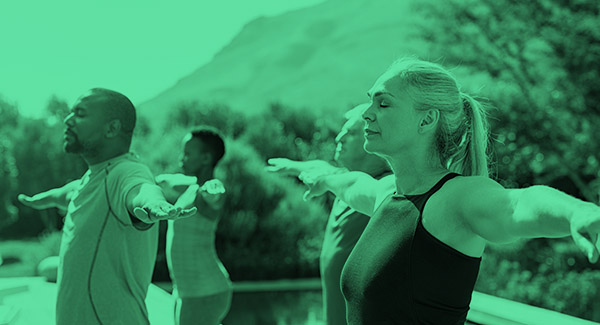How to Find a Yoga Instructor
Get tips for choosing a yoga instructor with arthritis experience who can help you adjust your poses and reduce joint strain.
By Susan Bernstein
Yoga is a practice of flowing physical poses and breathing techniques that can be a safe, gentle way for people with arthritis to improve fitness and flexibility. Yoga may be practiced daily at home or in a class. After consulting with your physician about starting yoga, it’s a good idea to begin practicing in a class setting or with a private instructor, says yoga and arthritis expert Steffany Moonaz, PhD, who created Yoga for Arthritis and helped develop and lead the Arthritis Foundation’s Arthritis-Friendly Yoga DVD.
Tips for Choosing a Yoga Instructor
“An instructor can observe you and help you make modifications to your poses,” Moonaz says. He or she can also advise you on different ways to move through poses so they place less strain on weakened joints, reducing the chance of injury.
Moonaz offers a few tips to find classes or instructors that may be more appropriate for people with arthritis.
“It can be very beneficial to find a class designed for people with arthritis, because everybody in the class will also be affected by arthritis, and struggling with it in one way or another,” says Moonaz. If there are no arthritis yoga classes nearby, look for sessions offering gentle yoga, beginners yoga, or yoga for seniors. These courses will likely attract other people with arthritis, so you will feel less awkward needing to modify poses or ask for help, says Moonaz. They may be less strenuous and will have instructors who provide more guidance in learning the poses, since the participants are all new to yoga or need gentler moves.
Look for gentle classes at YMCAs, yoga studios, health clubs, community centers and senior centers. Don’t choose the most popular yoga classes, which will be crowded and make it more difficult to get personal instruction if you need it, she adds.
Before signing up for a class, call first to learn more about the instructor’s experience, Moonaz says. Be honest about your physical limitations. Ask the following questions: Do the instructors have any experience working with people with arthritis? Are they certified by the Yoga Alliance, an accrediting body that ensures a minimum level of training in physiology, practical experience and other standards? How long has the instructor been teaching yoga?
At your first yoga class, arrive about 15 minutes early so you can speak with the instructor and let her know that you have arthritis. Ask her if she can suggest any modifications that might protect your joints or if you should take any special precautions to avoid injury. If your instructor is aware of your personal needs, she can provide specific guidance for you.
No matter what your physical condition now, an instructor should lead you through a yoga routine that, in time, will improve your flexibility, stamina and fitness, says Moonaz.
If you are interested in becoming a yoga instructor, review this resource.

Stay in the Know. Live in the Yes.
Get involved with the arthritis community. Tell us a little about yourself and, based on your interests, you’ll receive emails packed with the latest information and resources to live your best life and connect with others.

